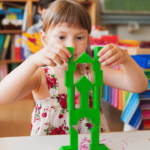
Enhance Parent Child Communication for Stronger Bonds | Expert Strategies
Effective communication is the cornerstone of a strong parent child relationship. When parents and children can openly and positively communicate with each other, it not only strengthens their bond but also helps children develop important skills that will benefit them throughout their lives.
The Center for Effective Parenting highlights the significance of creating an environment of open communication and respect, where children feel heard and understood. By implementing effective communication strategies, parents can improve their parent-child relationship and foster healthy family dynamics.
Key Takeaways:
- Open and positive communication is essential for building strong parent-child relationships.
- Effective communication skills learned in childhood can have long-lasting benefits for children.
- Parents should create an environment where children feel comfortable expressing themselves.
- Active listening and using age-appropriate language are essential components of effective communication.
- Nonverbal communication cues, such as facial expressions and gestures, can enhance parent-child interactions.
The Importance of Positive Communication Techniques
Positive communication techniques are essential in fostering open and effective parent-child communication. By using these techniques, parents can strengthen family communication, enhance parent-child interaction, and create a nurturing environment for healthy relationships to thrive.
Starting from a young age, parents should make themselves available to answer questions and engage in conversations with their children. This availability and willingness to communicate fosters openness and trust, laying the foundation for strong family bonds.
One key aspect of positive communication is providing love, understanding, and acceptance. By creating an atmosphere of acceptance, children feel respected and valued, which encourages them to express themselves openly. Verbal and nonverbal gestures of acceptance, such as positive messages, gestures, and facial expressions, further reinforce the sense of being heard and understood.
It is crucial for parents to communicate at their children’s level, using age-appropriate language and physically coming down to their level to maintain eye contact. By doing so, parents show their children that they are on the same level of importance and demonstrate their commitment to actively engaging in meaningful conversations.
“Effective communication is not just about words; it’s about creating an environment where children feel comfortable expressing themselves.”
Active listening and reflective listening are two essential skills that parents should practice to demonstrate their genuine interest and engagement in the conversation. Active listening involves giving full attention, maintaining eye contact, and showing empathy. Reflective listening, on the other hand, entails repeating back what the child said using different words, indicating understanding and validation.
By employing positive communication techniques, parents can lay the groundwork for open and ongoing conversations. These techniques not only enhance parent-child interactions but also promote the development of healthy relationships and strengthen family communication as a whole.
Effective Strategies for Parent Child Communication
When it comes to promoting healthy parent-child communication, it is essential for parents to develop effective communication skills. Here are some strategies that can enhance communication between parents and their children:
- Active Listening: Giving full attention, maintaining eye contact, and showing genuine interest in what your child is saying can make them feel valued and heard.
- Reflective Listening: Repeat back what your child said in your own words to show that you are attentive and understanding of their perspective.
- Speaking Clearly: Using age-appropriate language and speaking clearly helps children comprehend and feel respected during conversations.
- Asking Open-Ended Questions: Encouraging your child to express themselves through open-ended questions can foster a deeper and more engaging conversation.
- Keeping Conversations Brief: Finding the right time to talk, even if it’s just a few minutes a day, can make a significant impact on parent-child communication.
By implementing these strategies, parents can create an environment that promotes healthy and positive communication between themselves and their children. Effective communication builds trust, strengthens relationships, and fosters emotional well-being. Developing strong communication skills equips children with the necessary tools to express themselves, understand others, and navigate various social interactions throughout their lives.
The Power of Effective Communication
Effective communication between parents and children is a key factor in promoting healthy parent-child relationships. It enriches the bond between parents and their children, enhances understanding, and nurtures emotional development.
When parents actively listen and engage in meaningful conversations, they create a safe space for their children to share their thoughts, feelings, and experiences. This fosters trust, strengthens the parent-child relationship, and promotes emotional well-being.
“Good communication is as stimulating as black coffee and just as hard to sleep after.” – Anne Morrow Lindbergh
Open and effective communication also allows parents to guide their children’s behavior, set expectations, and teach important life skills. By utilizing strategies such as active listening, reflective listening, speaking clearly, asking open-ended questions, and keeping conversations brief, parents can create a positive and nurturing environment that supports healthy parent-child communication.
Benefits of Strong Parent-Child Communication
The benefits of strong parent-child communication extend beyond childhood. Children with effective communication skills grow up to become confident and capable individuals who can express their thoughts and emotions in a healthy manner. They develop strong interpersonal skills, empathy, and understanding, which contribute to their personal and professional success.
Furthermore, positive parent-child communication facilitates conflict resolution in a respectful and constructive way. It helps children develop problem-solving skills, teaches them to manage their emotions, and builds resilience.
| Benefits of Strong Parent-Child Communication | |
|---|---|
| Enhanced self-esteem and confidence | |
| Improved social and interpersonal skills | |
| Effective conflict resolution and problem-solving abilities | |
| Stronger parent-child relationships | |
| Nurturing emotional well-being | |
| Development of empathy and understanding |
Effective strategies for parent-child communication lay the foundation for a lifetime of healthy relationships and positive interactions. By prioritizing communication and utilizing these strategies, parents can create a nurturing environment that supports their children’s emotional growth, development, and overall well-being.
Nonverbal Communication and Creating a Positive Environment
Communication extends beyond mere words; nonverbal communication plays a vital role in strengthening family bonds and promoting understanding in parent-child relationships. Nonverbal cues, such as facial expressions, eye contact, personal space, hand gestures, and physical touch, serve as powerful signals that convey love, empathy, and connection.
When parents create a positive environment and share uplifting stories, children feel valued and develop a sense of self-worth. This practice also reinforces desired behaviors, encouraging children to continue making positive choices and contributing to the harmonious atmosphere within the family.
“Creating a positive environment where positive stories are shared helps children feel good about themselves and reinforces desired behaviors.”
It is important for parents to focus on their child’s behaviors rather than criticizing the child personally. By directing attention towards specific actions, parents can guide their children to understand the impact of their behavior and make positive changes.
Leading by example is imperative in parent-child communication. Children learn from observing their parents’ actions and words. It is crucial for parents to set a positive example, carefully choosing their words and actions to create an environment that fosters healthy communication and respectful interactions.
Nonverbal Communication Techniques
Nonverbal communication can be supported through the following techniques:
- Use warm and inviting facial expressions to demonstrate love and understanding.
- Maintain eye contact while listening to your child, showing that you are attentive and interested in what they have to say.
- Respect personal space and boundaries, allowing your child to feel safe and secure.
- Utilize hand gestures and physical touch, such as hugs or gentle pats on the back, to convey affection and comfort.
By integrating these nonverbal communication techniques into daily interactions, parents can create an environment that nurtures strong family bonds and promotes open dialogue with their children.
Conclusion
Effective parent-child communication is crucial for strengthening family bonds and promoting a nurturing environment. By using active listening, speaking clearly, and creating a positive atmosphere, parents can build open dialogue and understanding with their children. These communication strategies not only enhance the parent-child relationship but also contribute to the child’s self-esteem and overall well-being.
Establishing good communication habits from a young age sets the foundation for lifelong positive communication skills. Parents who prioritize communication create an environment where children feel heard, valued, and respected. This fosters trust and establishes a strong emotional connection within the family.
Through consistent practice of positive communication techniques, parents can promote healthy parent-child relationships and strengthen the family bonds. Investing time and effort into parent-child communication cultivates an atmosphere of trust, love, and support, providing a solid foundation for the growth and development of each family member.
Frequently Asked Questions
What is the importance of effective communication between parents and children?
Effective communication between parents and children is crucial for building strong, healthy family bonds. It helps children develop self-esteem and cooperation, benefiting them throughout their lives.
What are some positive communication techniques that can foster open parent-child communication?
Positive communication techniques include making oneself available to answer questions and have conversations, providing love and understanding, using verbal and nonverbal gestures of acceptance, and communicating at the child’s level.
What are some effective strategies to enhance parent-child communication?
Effective strategies include active listening, reflective listening, speaking clearly and using age-appropriate language, asking open-ended questions, keeping conversations brief, and finding the right time to talk.
How does nonverbal communication contribute to parent-child relationships?
Nonverbal cues such as facial expressions, eye contact, personal space, hand gestures, and physical touch convey messages of love, understanding, and connection. Creating a positive environment where positive stories are shared also strengthens parent-child relationships.
Why is parent-child communication important for strengthening family bonds?
Parent-child communication is fundamental for building and maintaining strong family bonds. By practicing positive communication strategies, parents can promote healthy relationships, enhance their children’s self-esteem, and create a nurturing environment.













